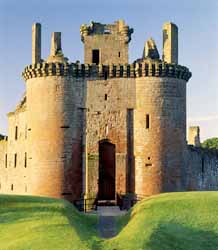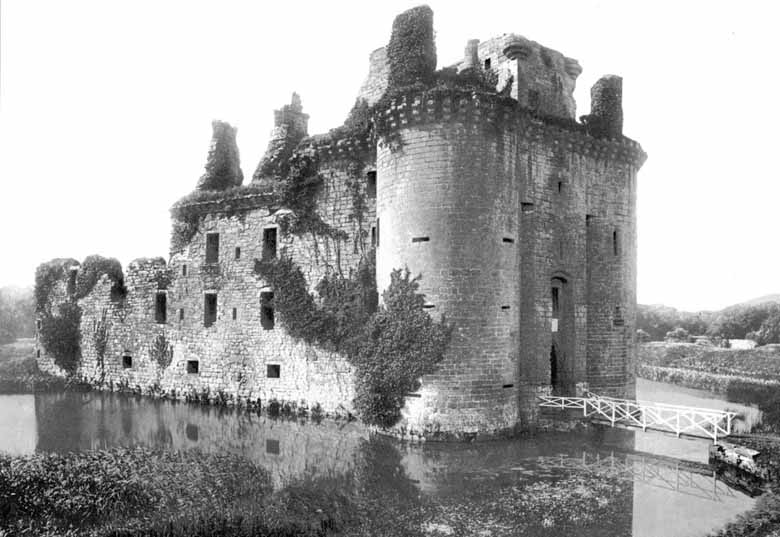Clan Maxwell
The name Maxwell originates from Maccus, a Norse chief and son of Undweyn, who gave his name to Maccuswell, a pool of the river Tweed near Kelso bridge. A grandson of Maccus, John Maxwell, became chamberlain of Scotland before dying in 1241, to be succeeded by his brother Aylmer. From Aylmer sprang many branches of the family throughout the south-west of Scotland.
Sir Herbert Maxwell won great fame by defending his Caerlaverock Castle against King Edward I of England in 1300. During the Wars of Scottish Independence the Clan Maxwell supported King Robert the Bruce and fought at his side at the Battle of Bannockburn in 1314, under the clan chief of Eustace Maxwell. Herbert, the succeeding clan chief was knighted by King James I of Scotland for his services to the crown. Another Sir Herbert Maxwell was made a lord of the Scottish parliament before 1445.
His great-grandson John, 3rd Lord Maxwell, was killed at the Battle of Flodden Field fighting against the English in 1513 during the Anglo-Scottish Wars. The fifth Lord Maxwell intrigued with King Henry VII of England, although by 1542 King James V of Scotland had appointed him warden of the marches and an Extraordinary Lord of Session. Maxwell was captured by the English at the Battle of Solway Moss in the same year. The Clan Maxwell fought on the side of Mary, Queen of Scots at the Battle of Langside in 1568. .... more

Caerlaverock Castle is near
Dumfries, where in 1306 Robert the Bruce killed John "the Red Comyn" in the Church of the Grey Friars
- A1. Undweyn;
- B1. Maccus, lvd:1116;
- C1. Hugo de Macuswell;
- D1. Herbert de Macuswell, Sheriff of Teviotdale;
- E1. Aymer de Macuswell, Chamberlain, Justiciar, lvd:1264, m. Mary McGeachen;
- F1. Sir John de Maxwell of Pollock;
- G1. Sir Robert de Maxwell of Pollock;
- H1. Sir John de Maxwell of Pollock;
- I1. Sir John de Maxwell of Pollock, lvd:1388, m. Elizabeth Lindsay;
==> Clan Lindsay
- J1. Agnes Maxwell, m. Sir Gilbert Kennedy; <== Clan Kennedy
- J2. Robert Maxwell of Calderwood, m. Elizabeth Denniston;
- K1. Mariota Maxwell, m. Sir Robert Boyd; <== Clan Boyd
- I1. Sir John de Maxwell of Pollock, lvd:1388, m. Elizabeth Lindsay;
==> Clan Lindsay
- H1. Sir John de Maxwell of Pollock;
- G1. Sir Robert de Maxwell of Pollock;
- F2. Sir Herbert de Maxwell of Carlaverock, d:1298;
- G1. Sir John de Maxwell of Carlaverock, d:1310;
- H1. Sir John de Maxwell of Carlaverock;
- I1. Sir John de Maxwell of Carlaverock, d:1373;
- J1. Ann Maxwell, m. Hamelin Leslie; <== Clan Leslie
- J2. Elizabeth Maxwell, m. Hugh de Dacre; <== Dacre family
- J3. Sir Robert de Maxwell of Carlaverock;
- K1. Sir Herbert de Maxwell of Carlaverock, m. Katherine Stewart;
==> Clan Stewart
- L1. Margaret Maxwell, m. Sir John Montgomery; <== Clan Montgomery
- L2. Sir Herbert Maxwell, 1st Lord of Carlaverock, m. N. Herries;
- M1. Katherine Maxwell, m. Sir Gilbert Kennedy; <== Clan Kennedy
- K1. Sir Herbert de Maxwell of Carlaverock, m. Katherine Stewart;
==> Clan Stewart
- I1. Sir John de Maxwell of Carlaverock, d:1373;
- H1. Sir John de Maxwell of Carlaverock;
- G1. Sir John de Maxwell of Carlaverock, d:1310;
- F1. Sir John de Maxwell of Pollock;
- E1. Aymer de Macuswell, Chamberlain, Justiciar, lvd:1264, m. Mary McGeachen;
- D1. Herbert de Macuswell, Sheriff of Teviotdale;
- C1. Hugo de Macuswell;
- B1. Maccus, lvd:1116;
